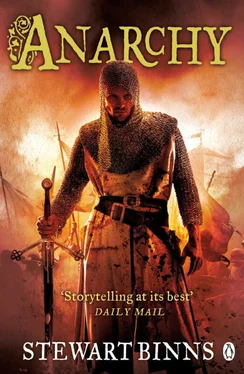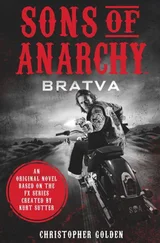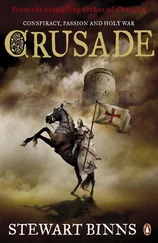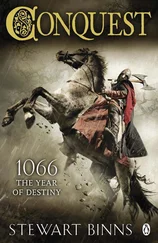Word began to circulate that the Genoese navy had found the pirate fleet far out in the Adriatic and sent it to the bottom in flames. Not only had Ordelafo destroyed the pirates’ safe haven, he had also wrecked the tools of their trade.
The Doge had had a plan all along: it later transpired that he had struck a deal with the Doge of Genoa many weeks earlier. He had paid the Genoese a huge geld for their services and had agreed to keep out of their trading area west of Sicily. The amphibious strategy was a masterstroke; his victory was complete.
I spent the night in the field infirmary. Fortunately, it was several hundred yards away from the camp, far removed from the revelries of a victorious army. The no-alcohol policy the Doge had insisted upon before battle did not apply afterwards, and the celebrations were as expected – raucous and exhaustive. Even so, Ordelafo still imposed rigid discipline: no looting and no rape. Both were punishable by execution.
Although the merriment was a long way off, I did not sleep well. My faced burned, and hot blood still coursed through my veins from the day’s battle. I had fought well. But more importantly, I had learned how to deal with fear and had memorized a little catechism that would serve me well.
‘Control fear before the fight; harness it during the fight and let it give you strength.’
It was what my grandfather had always said. And he was right.
The next day, the surviving civilian population of the city was led away in a long column. The wretched souls were escorted north for several miles, given carts of flour and a small herd of goats, then left to fend for themselves. It was a generous offering by the Doge, contrary to the usual practice of selling prisoners into slavery or worse.
Two days later, despite my burns, I was able to ride and left Zadar with the rest of the army. It took a long time to obliterate the odour of the ruined city from my memory. The smell of charred timbers and burned flesh seemed to hang on me like a woollen cloak. I could taste the bitter tang of ash on my tongue, and every time I ruffled my clothes a pungent dust stung my eyes.
I also evoked the memory of the sounds repeatedly. For many days afterwards, whenever I heard a horse neigh or someone shout loudly, the screams and cries of the dying of Zadar flooded into my head. It was difficult to sleep, and I had vivid dreams – especially one that repeated the moment when my foes were incinerated before my eyes on the ramparts of the city.
Eadmer said that what I was experiencing was normal and that the dreams and memories would soon fade. But he stressed fade, rather than pass, and told me that he still had vivid recollections of the battles he had fought. As always, he was a great comfort to me.
When we reached the ships at Senj, we made camp. It took several days to load the ships; most of the sappers were still at Zadar dismantling the catapults. The rain had relented and there was bright sunshine to illuminate the beautiful crescent-shaped harbour and the wooded hillsides above it. What a contrast it made to the scene we had left further down the coast. Both Senj and Zadar were small picturesque trading ports, of ancient pedigree. One remained so; the other was a vision from Hell.
I was hoping to be summoned by the Doge and that he would have heard of our exploits in the battle. I was proud of our role in the attack and prayed that it would be another step towards the recognition I sought. I had not seen him after we scaled the walls of the city. I had been in the infirmary, and he had ridden on ahead to supervise the embarkation of the army at Senj before I rejoined the column.
Sadly, the summons never came. When the stewards went to the Doge’s tent the next morning, he was lying cold in his bed. He had died in the night. He was fit and strong, so poison was suspected at first. But he had no enemies in Venice, and it was difficult to imagine how the defeated pirates could have got a deadly potion into his food or drink. The physicians said that almost all poisons would have woken him in pain, and that he had eaten several hours before retiring. The water and wine in his tent were checked and both were found to be untainted.
The physicians decided that the Most Serene Prince, Ordelafo Faliero, the 34th Doge of Venice, had died from a sudden and severe apoplexy in the night. What a paradox it was: a soldier all his life and about to receive the accolade of having masterminded a famous victory for Venice, and he dies in his bed. On the other hand, he could have met a worse fate – perhaps as grisly as those who died in Zadar.
There was a huge victory procession along the Canalazzo to welcome home the conquering fleet, but the city’s joy was tempered by the loss of the Doge, one of the city’s most respected leaders. The Grand Council decided on a clever reflection of the contrasting emotions: half the city’s flags were flown in celebration, and alternate flags were flown at half mast. Similarly, the crowds on the left bank of the Grand Canal were encouraged to cheer loudly, while those on the right were asked to bow their heads. It made for a very poignant homecoming.
The four of us got very merry that night in one of the city’s many waterside hostelries and took full advantage of the affections offered by the young women of Venice, eager to reward the heroics of its warriors. My swollen and blistered face did not prove to be too much of an obstacle to at least one willing young lady, who thought my quaint English voice adequate compensation for a less than handsome countenance.
The following weeks passed slowly. It was a time for reflection. It was hard to deal with the disappointment after Zadar. We had fought well and survived, but my hoped-for reward in recognition from the Doge and the possibility of a knight’s pennon seemed doomed by his sudden death.
I had a decision to make. Should I move on to the Holy Land and seek a new adventure, or stay in Venice to consolidate what we had achieved as marines?
Fulham Palace, 30 November 1186
Dear Thibaud,
I pray that life is comfortable for you. There are some ecclesiastical issues that I would welcome your advice on, but I will write separately about them.
The fascinating story of Harold of Hereford continues below. It is a sad story, in part, my friend. When the old knight recounted some of the details, his eyes were filled with tears. He was telling a story from almost sixty years earlier, but it was obvious it was as fresh in his memory as the events of yesterday.
When he had finished the last instalment, he told me he needed to take a break for a few days. I didn’t see him again for almost a week. It was a fortunate coincidence because my scribes were in much need of rest and refreshment before I could continue my account. I find I must remind them daily that it is a privilege to be made privy to the details of such a remarkable life.
Winter now has London in its icy grip. There are no boats on the Thames, but there is much traffic. I went to St Paul’s today by carriage and we were able to travel the whole way on the frozen waters. The boatmen tell me that the ice is a foot thick at London Bridge.
I had another fall yesterday. I couldn’t get up. It took three of them to get me into a chair. Ah well, so be it; it is the will of God.
Yours in God, Gilbert
The new Doge was appointed in February 1118, after what was said to be a very fractious meeting of the Grand Council. The Old Families were split and so a compromise candidate emerged who was from a wealthy new mercantile family but with a strong military background, in the tradition of Ordelafo Faliero. My ears pricked up when I heard the news.
Domenico Michele was installed as the 35th Doge in a dazzling ceremony in March of 1118. The spring tides were in full bore and the Canalazzo’s waters lapped halfway up the steps of the great palaces along its banks as the bucentaur, the Doge’s beautiful state galley, was rowed past the cheering crowds. He sat on the throne in the stern, and the prow bore a figurehead representing Justice with sword and scales.
Читать дальше












